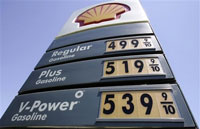Oil prices keep falling
Oil prices kept falling Friday on expectations that slowing economic growth in developed countries will cut demand for crude products, such as gasoline and heating oil.

The releases later Friday of U.S. payroll and unemployment figures for June, as well as July car sales, will be watched closely by the market for more signs of where the American economy is heading.
By midday in Europe, light, sweet crude for September delivery fell US$1.22 to US$122.86 a barrel in electronic trading on the New York Mercantile Exchange. The contract lost US$2.69 overnight to settle at US$124.08 a barrel.
In London, September Brent crude was down US$1.97 at US$122.01 a barrel on the ICE Futures exchange.
"The market is selling off because of the weak economic numbers out of the U.S.," said Tetsu Emori, commodity markets fund manager at ASTMAX Futures Co. in Tokyo. "Growth and oil demand is slowing in the U.S., Europe and Japan, and it's too optimistic to think emerging market demand will compensate for that."
The U.S. Commerce Department said Thursday that the country's gross domestic product rose just 1.9 percent in the second quarter despite government tax rebates aimed at boosting the economy. Economists had expected growth of 2.4 percent. The weak 1 percent GDP figure of the first three months of 2008 was also modified lower to 0.9 percent.
While oil prices rose briefly Thursday as the U.S. dollar weakened in the immediate reaction to the disappointing GDP figures, they began sliding again even as the dollar lost ground to other major currencies.
This, analysts said, was because the usual correlation between high oil prices and the weaker dollar was no longer a given.
"The overall momentum on crude oil has clearly changed from the dynamics of the first half of the year," said Olivier Jakob of Petromatrix in Switzerland.
He noted that news which earlier would almost certainly have pushed prices higher, like attacks on oil pipelines in Nigeria and worries about Iran's nuclear ambitions, was no longer "enough to provide sustained support."
A deadline expires Saturday for Tehran to show it will stop expanding its uranium enrichment program, at least temporarily, or face the threat of new U.N. sanctions.
Earlier this week, Iranian officials, including supreme leader Ayatollah Ali Khamenei, pledged to continue the country's nuclear program.
Meanwhile, a Labor Department report said Thursday the number of people seeking jobless benefits rose to the highest level in five years.
Easing American pump prices are further evidence of waning consumption of gasoline. The average price of a gallon of regular slipped 1.7 cents to US$3.909, according to auto club AAA, the Oil Price Information Service and Wright Express.
Nymex oil prices have dropped off around US$24 a barrel since reaching a record high of US$147.27 on July 11.
"Prices will likely correct over the next six months to the US$100 to US$110 range," Emori said. "There aren't enough fundamental factors right now pushing prices higher."
In other Nymex trading, heating oil futures fell 3.84 cents to US$3.4209 a gallon (3.8 liters) while gasoline prices fell 3.49 cents to US$3.0360 a gallon. Natural gas futures fell 6.5 cents to US$9.054 per 1,000 cubic feet.
Subscribe to Pravda.Ru Telegram channel, Facebook, RSS!


